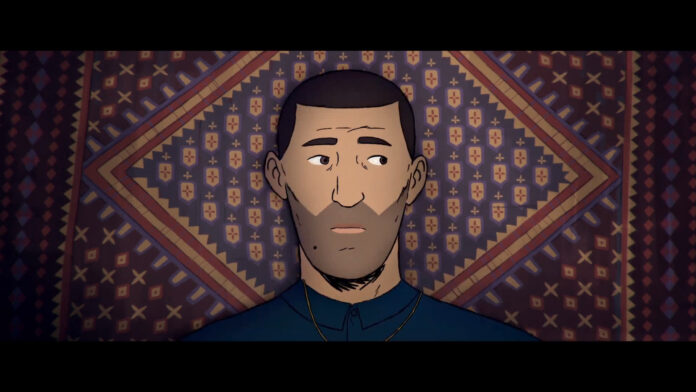Jonas Poher Rasmussen’s Flee has swept many a Best Documentary Feature award already (at least those not claimed by Summer of Soul), which is something of a curiosity. Not because it isn’t good, because it very much is. But rather because you might question whether it’s exactly a “documentary” at all.
It’s based on first-person testimony, yes, and that person’s voice is duly heard on the soundtrack. But other people (and the protagonist himself at younger ages) are voiced by professional actors, performing a script, and depicted by animation. I’m not sure Flee is any more of a documentary, per se, than the similarly biographical cartoon Persepolis was, and am more comfortable regarding it as probably the year’s best animated feature—though you’re certainly welcome to think of it as both, or even all three (adding “Best Foreign Language Feature” to the mix).
In any case, all category-quibbling aside, this hybrid successfully deploys and expands the genres of ‘toon, dramatic, and nonfiction cinema. While feature animation usually leans toward spectacle and fantasy, not to mention juvenile content, Flee impresses particularly because it’s at heart very much about messy, real-world grownup psychology. It’s even framed as a series of sessions with a shrink.
Those sessions are for the benefit of Amin (voiced in maturity by the actual “Amin Nawabi.” an assumed name to protect his identity), who is freaking out a bit over his inexplicable fears of commitment towards long-term partner Kasper, with whom he lives in Denmark. But as we soon discover (while he reviews his past on the analytic couch), Amin has plenty of reasons to live in defensive terror that everything and everyone he loves might be taken away. Indeed, that’s kind of the way things have gone for his family, his culture, and his country of origin in general.
As a child in Afghanistan, his father was arrested and “disappeared” simply for having been allied with the prior, Soviet-supported regime after the mujahideen came to power in the 1980s. One of Amin’s brothers was then forced into the army, another went into hiding. Before the same could happen to him, he, his mother and another sibling fled to Russia, the only country that would grant them a tourist visa.
That’s just the start of an agonizingly long refugee odyssey in which the family is further split apart by the vagaries of foreign governments, human smugglers, and so forth. Moscow is hardly a welcoming place, between its corrupt bribe-seeking police and the chaos generated by the then-still-new fall of Communism. Despite already having a brother settled in Sweden, these stateless fugitives find the paths open to them sporadically at best, and even then, the way is often frightening and hazardous.
Amir finally lands in Denmark, more by chance than choice, and is able to make a life for himself there—perhaps more easily than he might have elsewhere, as a gay man. But despite the love and acceptance he eventually finds, it’s no wonder he has trust issues, the rug having been pulled out from under so many times in his life already.
Though it deploys a number of animation techniques, Flee hews mostly to a rather simple line-drawing style—the opposite from something like the concurrent Japanese Belle, whose colorful scale and detail are often overwhelming. Yet Belle applies that visual extravagance to little more than the simplest tween-friendly princess-cum-popstar fantasy. In Flee, a comparatively bare-bones (but still artful) aesthetic renders both vivid and bearable content that might be too depressing or upsetting in a live-action film, given the sometimes harrowing ordeals that Amir and his family go through.
More, the movie finds narrative means to convey a complex inner ambivalence borne of those ordeals; borne even of Afghanistan’s neverending tragedy as a whole, forever shunted between regimes and crises. Through it all, you get a visceral sense of how extremely vulnerable it is to be a person without a country.
Even so, there’s room for humor here, in Amir’s telltale formative crush on Jean-Claude Van Damme (hard to argue with that choice), or the happy surprise with which his coming-out does not turn out to be traumatic, after all. It’s a serpentine tale with a happy ending and a certain Woody Allenesque “How much will this mental health cost me?” neurotic esprit. Opening in local theaters early this year while in contention for various 2021 awards, Flee definitely looks like one of the best movies of either annum.
Flee opens Fri/21 at area theaters including the Landmark Embarcadero in SF, Shattuck Cinemas in Berkeley, and AMC Bay Street in Emeryville.








